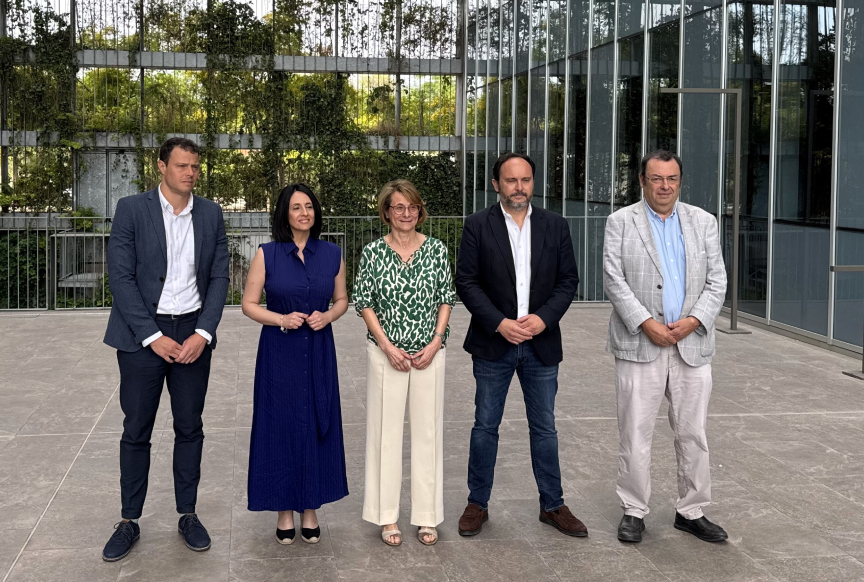News
Q-Cero alliance debates in Castellón the challenges of decarbonisation to achieve a more sustainable and competitive industry in the Valencia region
- The Q-Cero alliance, the Ceramic Technology Institute (ITC), and the Jaume I University (UJI) have addressed the challenges facing companies in the energy transition
- The event, held in the Assembly Hall of the UJI Faculty of Health Sciences, was opened by the Rector Eva Alcón and featured a speech by the Secretary of State for Industry, Rebeca Torró
- The ITC presented the findings of a study on the electrical needs of the ceramic sector in the province

From left to right: Javier Mazorra, Coordinator of the Q-Cero Alliance; Rebeca Torró, Secretary of State for Industry; Eva Alcón, Rector of Jaume I University (UJI); Jorge Blanco, General Director of Quality and Environmental Education at the Generalitat Valenciana; and Juan Vicente Bono, President of the Ceramic Technology Institute (ITC)
The Q-Cero alliance, driven by Iberdrola España, the Ceramic Technology Institute (ITC), and Jaume I University (UJI), brought together over 150 professionals from various industrial sectors for the event "Towards a decarbonised and competitive industry: Strategies and opportunities for the Valencia region. Case study: The ceramic industry in Castellón." Industrial sectors are facing a major challenge: the energy transition towards decarbonisation, which enables sustainability without losing competitiveness.
Eva Alcón, Rector of UJI, welcomed the attendees and expressed gratitude for the university being chosen as the venue to share experiences among companies. She also highlighted research, science, and technology as essential tools to achieve a cleaner and more efficient industrial model.
Rebeca Torró, Secretary of State for Industry, highlighted the progress of the Q-Cero alliance, stressing that decarbonisation must be the foundation of the reindustrialisation of companies, which will enhance the country's competitiveness. She emphasised the importance of public-private collaboration in this process.
Juan Vicente Bono, President of ITC, pointed out that industrial decarbonisation is a challenge, and the institute has been researching this field for many years. This effort has taken time and requires the support of public administrations and companies.
Javier Mazorra, Coordinator of the Q-Cero alliance, explained that the alliance, which started with 40 members and now exceeds 120, aims to showcase and advance different decarbonisation options for various industrial sectors. He views decarbonisation as a collective and unifying challenge that ensures the competitiveness of the Spanish industry and believes that, to progress more quickly, connections must be made between all stakeholders, particularly between supply and demand.
Jorge Blanco, General Director of Quality and Environmental Education at the Generalitat Valenciana, encouraged further improvement of energy efficiency in the ceramic sector’s production processes, which is already testing new technologies that have proven technically effective.
The event continued with the first roundtable, titled "Technological outlook of industrial decarbonisation," moderated by UJI Professor Eliseo Monfort. The discussion included Antonio Hernández (EY Consulting); Cecilia Berganza (Cemex España); Virginia Martínez (Importaco); Javier Rivera (PowerCO); and Pascual Parra (Nazca Capital), who addressed the diverse needs of various industries. They concluded that many technologies have already been implemented in different sectors, but they need to be consolidated and made accessible to ensure companies do not lose competitiveness.
During the event, Salvador Ferrer, a researcher in ITC's Sustainability Area, presented a study on "Estimating the electrical needs of the ceramic sector in Castellón," forecasting the electrical power required in the coming years for ceramic companies to continue their electrification processes.
The presentation of the report led to a roundtable discussion featuring Jorge Fabregat (Porcelanosa), Rogelio Vila (Equipe), Pedro Fresco (AVAESEN), Maite Vela (Redeia), Javier Bon (i-DE Iberdrola), Rafa Vicent (Kerajet), and Vicente Aparici (Systemfoc), who shared their views on this technology's potential and positive experiences with installed electric furnaces. They also highlighted the important work carried out in the study to understand the real needs and the significance of collaboration among all stakeholders to harness the potential of electrification.
The event was concluded by Felipe Carrasco, Secretary for Industry, Commerce, and Consumption of the Generalitat Valenciana.
The event provided an opportunity to understand the present and future of industrial decarbonisation in Castellón, share experiences, analyse barriers, identify perspectives, and foster collaboration among industries, administrations, and academia to work together to achieve these ambitious goals and seize the opportunities that arise.
Opportunity in the energy transition
The Q-Cero alliance, driven by Iberdrola España, is designed as a platform where all stakeholders come together to discuss the current situation, showcase achievements, identify bottlenecks, and propose activities to accelerate decarbonisation in different sectors, maintaining competitiveness and contributing to the realisation of opportunities in the energy transition.
The Clean Industrial Deal presented by the European Union responds to these challenges, aiming to increase the competitiveness of the European economy by deepening the decarbonisation of the industrial sector through electrification, which is the fastest and most efficient approach to achieve this goal.
Decarbonising heat is essential to protect the environment, increase energy autonomy, and reduce fossil fuel imports. It also presents an opportunity to lead the industry of the future and attract new activities across the value chain of these solutions.
